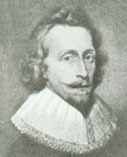 John Fletcher came of a family which has given many distinguished names to English literature. His father was Richard Fletcher, Bishop of London. Giles Fletcher the elder was his uncle, and Giles and Phineas Fletcher his cousins. The dramatist was born at Rye, Sussex, in 1579, and entered Benet College (now Corpus Christi), Cambridge, in 1591; but of the details of his life from this time till his appearance as a dramatist little is known. He collaborated with Beaumont from about 1605 till 1612; and, after Beaumont's withdrawel, with Shakespeare, Jonson, Massinger, and others. He died of the plague in 1625.
John Fletcher came of a family which has given many distinguished names to English literature. His father was Richard Fletcher, Bishop of London. Giles Fletcher the elder was his uncle, and Giles and Phineas Fletcher his cousins. The dramatist was born at Rye, Sussex, in 1579, and entered Benet College (now Corpus Christi), Cambridge, in 1591; but of the details of his life from this time till his appearance as a dramatist little is known. He collaborated with Beaumont from about 1605 till 1612; and, after Beaumont's withdrawel, with Shakespeare, Jonson, Massinger, and others. He died of the plague in 1625.
The men who laid the foundations of the Elizabethan drama were generally of somewhat obscure origin; and though some of them had been educated at the universities, they were all poor. Beaumont and Fletcher were the first recruits to the profession of play-writing who came of distinguished families and habitually moved in wealthy circles; and this social environment was early suggested as an explanation of their power of representing naturally the conversation of high-born ladies and gentlemen. The general style of their plays has been thus admirably characterized by Thorndike: "Their plots, largely invented, are ingenious and complicated. They deal with royal or noble persons, with heroic actions, and are placed in foreign localities. The conquests, usurpations, and passions that ruin kingdoms are their themes, there are no battles or pageants, and the action is usually confined to the rooms of the palace or its immediate neighborhood. Usually contrasting a story of gross sensual passion with one of idyllic love, they introduce a great variety of incidents, and aim at constant but varied excitement . . . . The plays depend for interest not on their observation or revelation of human nature, or the development of character, but on the variety of situations, the clever construction that holds the interest through one suspense to another up to the unravelling at the very end, and on the naturalness, felicity, and vigor of the poetry."
The first quarto of The Faithful Shepherdess is undated, but it was certainly issued before May, 1610, and the play had been unsuccessfully produced not long before, perhaps in 1608 or 1609. Fletcher's chief model in this pastoral seems to have been Guarini's Pastor Fido, and some few details are borrowed from Spenser; but the plot itself seems to be original. The play, as Fletcher confesses in his address To the Reader, was unsuccessful on the stage, but the beauty of its lyric and descriptive poetry has given it, in spite of its weak dramatic quality, a distinguished place in literature. It is notable also as having in part suggested Milton's Comus.
The Wild Goose Chase, we are told by the publisher of the first folio edition of Beaumont and Fletcher, was lost when that volume was compiled; it reappeared later, and was issued separately, in folio, in 1652. A second edition appeared in the folio of 1679. The comedy is known to have been acted as early as 1621. No source for the plot seems as yet to have been found. Farquhar based on it his comedy of The Inconstant, a fact which points to the obvious relationship between the Fletcherian comedy, of which this is a typical example, and the drama of the Restoration.
Purchase Plays by John Fletcher
Search eBay! for John Fletcher collectibles